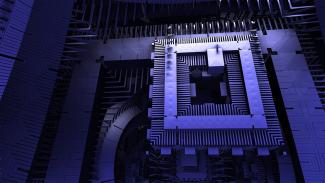NETL experts are preparing to put quantum computing, a rising, powerful and promising new force for complex and fast problem solving, to work on key energy research topics leading to an environmentally sustainable and prosperous energy future.
Quantum computing uses the principles of quantum mechanics to sift through large numbers of possibilities to extract solutions to complex problems at speeds exponentially higher than conventional computers with less energy consumption.
While classical computers store information as bits with either 0s or 1s, quantum computers use superposition of both 0s and 1s, which are called quantum bits (qubits). Qubits can carry information in a quantum state that engages 0 and 1 in a multidimensional way.
The growing potential of quantum computing holds promise for unraveling scientific mysteries in a wide range of areas leading to new solutions and approaches for security and intelligence, drug design, aerospace engineering, machine learning, digital manufacturing and dozens of other fields that require complex problem solving as part of the development process.
NETL’s Hari Paudel, Ph.D., a key member of NETL’s Quantum for Energy Systems and Technologies (QUEST) working group, is telling audiences at events dedicated to quantum information sciences (QIS) that quantum computing may be just the right tool to accelerate research projects focused on the drive for more effective clean energy technologies.
Paudel participated in a workshop organized by the Institute of Electrical and Electronics Engineers (IEEE) in September where he addressed the potential for using quantum computing and simulations for materials’ chemistry and optimization for energy technology development. IEEE is the world’s largest technical professional organization dedicated to advancing technology.
“QIS will profoundly change science and engineering in the coming decades,” Paudel said. “It will allow researchers to perform tasks that are impossible to do today like finding prime factors of large numbers or defining reaction mechanisms in complex chemical systems.”
He said specific energy research areas that will be the subject of quantum computing applications include subsurface engineering, creation of new more efficient sensors and detectors, power plant designs, development of carbon dioxide sorbents and solvents, creation of energy storage materials, electrical grid improvements, oil and gas pipeline innovations, cybersecurity improvements, high-performance materials development, and power plant operation and control improvements.
To prepare for the future impact of quantum computing on energy research, NETL launched QUEST to apply QIS to fossil energy technology development. In addition to Paudel, NETL QUEST members are Yuhua Duan, Dominic Alfonso, Yueh-Lin Lee, Scott Crawford, and Gary Lander, and experts at the University of Pittsburgh.
QUEST established a working group to develop, review, manage, and advise on quantum computing related technologies for the Laboratory and the U.S. Department of Energy’s Office of Fossil Energy and Carbon Management (FECM). Group members, along with their supervisors, are creating a training strategy to establish competency for proposing, executing and managing research projects within a one- to three-year timeline.
Paudel added that NETL’s Quantum Sensing project is pursuing selected near-term research and development opportunities for quantum sensing that can impact the FECM mission. For example, quantum sensing materials could be used in subsurface monitoring, natural gas infrastructure monitoring, and rare earth element detection.
He said NETL has a long record of planning for the emergence of quantum computing in the energy research arena. In 2019, for example, NETL leaders convened the Fossil Energy Workshop on Quantum Information Science and Technology, which was the first time that experts from a range of fields met to exchange information and explore potential research opportunities for quantum computing to advance fossil energy research projects.
Researchers around the globe are looking forward to the final stages of quantum computing evolution because a quantum computer is many times faster than a classical computer or even a supercomputer but takes a long time to build. IBM plans to have a 1,000-qubit quantum computer in place by the end of next year and currently allows access to its machines for research organizations that are a part of its Quantum Network.
At NETL, years of planning for the emergence of QIS and decades of energy research expertise and success have positioned its researchers to bring the era of quantum computing to bear on aggressive efforts to drive innovation and deliver solutions for an environmentally sustainable and prosperous energy future.
NETL is a U.S. Department of Energy national laboratory.




